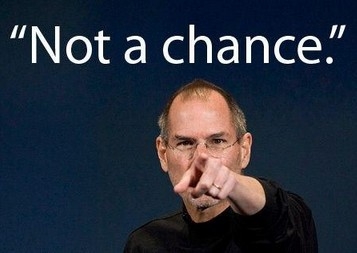Perot to the Rescue
救星佩羅
In late 1986 Jobs sent out a proposal to venture capital firms offering a 10% stake in NeXT for $3 million. That put a valuation on the entire company of $30 million, a number that Jobs had pulled out of thin air. Less than $7 million had gone into the company thus far, and there was little to show for it other than a neat logo and some snazzy offices. It had no revenue or products, nor any on the horizon. Not surprisingly, the venture capitalists all passed on the offer to invest.
1986年底,喬布斯向鳳投公司發出了招股說明書,300萬美元可購買NeXT公司10%的股份。也就是說整個公司的估值為3000萬美元,這一數值是喬布斯憑空想出來的。NeXT公司已經消耗了近700萬美元,但這筆錢毫無成效,只體現在優雅的標識和時髦的辦公室上。沒有收入,沒有產品,也沒有即將發布產品實現營收的跡象。因此,毫不奇怪,風投公司都沒有參與投資。
There was, however, one cowboy who was dazzled. Ross Perot, the bantam Texan who had founded Electronic Data Systems, then sold it to General Motors for $2.4 billion, happened to watch a PBS documentary, The Entrepreneurs, which had a segment on Jobs and NeXT in November 1986. He instantly identified with Jobs and his gang, so much so that, as he watched them on television, he said, “I was finishing their sentences for them.” It was a line eerily similar to one Sculley had often used. Perot called Jobs the next day and offered, “If you ever need an investor, call me.”
不過,倒是有一位頗具膽量的牛仔為NeXT公司神魂顛倒。羅斯·佩羅(RossPerot)是個矮小精干的得克薩斯人,他創辦了電子數據系統公司(ElectronicDataSystems),后以24億美元的價格賣給了通用汽車公司。1986年11月,佩羅碰巧看到了美國公共廣播公司的一部紀錄片《創業者》(TheEntrepreneurs),其中有一部分是關于喬布斯和NeXT公司的。佩羅當下就很欣賞喬布斯及其團隊,他邊看電視邊想,“我會幫助他們完成想法。”這句話與斯卡利過去常說的話極其相似。次日,佩羅就打電話給喬布斯,提出,“如果你需要投資者,給我打電話。”
Jobs did indeed need one, badly. But he was careful not to show it. He waited a week before calling back. Perot sent some of his analysts to size up NeXT, but Jobs took care to deal directly with Perot. One of his great regrets in life, Perot later said, was that he had not bought Microsoft, or a large stake in it, when a very young Bill Gates had come to visit him in Dallas in 1979. By the time Perot called Jobs, Microsoft had just gone public with a $1 billion valuation. Perot had missed out on the opportunity to make a lot of money and have a fun adventure. He was eager not to make that mistake again.
喬布斯確實需要,非常需要。然而他也足夠冷靜,沒有表現出來。過了一周他才回復佩羅的電話。佩羅派了一些自己的分析師來評估NeXT,而喬布斯則謹慎地直接同佩羅打交道。佩羅后來表示,自己人生中的最大憾事之一就是,1979年,當年輕的比爾·蓋茨前來達拉斯拜訪時,自己沒有收購微軟,或是買下大量股份。佩羅打給喬布斯的時候,微軟剛剛上市,市值10億美元。佩羅錯過了發大財和擁有一番有趣冒險的機會。因此,他非常不愿意再犯下類似的錯誤。
Jobs made an offer to Perot that was three times more costly than had quietly been offered to venture capitalists a few months earlier. For $20 million, Perot would get 16% of the equity in the company, after Jobs put in another $5 million. That meant the company would be valued at about $126 million. But money was not a major consideration for Perot. After a meeting with Jobs, he declared that he was in. “I pick the jockeys, and the jockeys pick the horses and ride them,” he told Jobs. “You guys are the ones I’m betting on, so you figure it out.”
喬布斯向佩羅提出的價錢,比數月前不動聲色地向其他不感興趣的風投公司提出的條件高出3倍。在喬布斯再投入500萬美元后,佩羅可以用2000萬美元買下NeXT公司16%的份。這意味著,該公司的估值將達到大約1.26億美元。但是,錢并不是佩羅考慮的主要因素。同喬布斯會面后,他宣布自己入伙。“我挑選騎師,騎師挑選馬匹并駕馭它們,”他對喬布斯說,“你們就是我賭的騎師,因此,你們看著辦。”
Perot brought to NeXT something that was almost as valuable as his $20 million lifeline: He was a quotable, spirited cheerleader for the company, who could lend it an air of credibility among grown-ups. “In terms of a startup company, it’s one that carries the least risk of any I’ve seen in 25 years in the computer industry,” he told the New York Times. “We’ve had some sophisticated people see the hardware—it blew them away. Steve and his whole NeXT team are the darnedest bunch of perfectionists I’ve ever seen.”
除了2000萬美元的救命錢,佩羅也為NeXT公司帶來了幾乎同樣寶貴的其他東西:他是公司津津樂道、精神昂揚的拉拉隊長,給員工帶來了信任的氛圍。“就創業公司而言,這是我在計算機行業25年時間里所見過的風險最小的企業。”他告訴《紐約時報》,“我們請一些專業人士看了硬件,他們都被震住了。史蒂夫和整個NeXT團隊是我所見過最厲害的完美主義者。”
Perot also traveled in rarefied social and business circles that complemented Jobs’s own. He took Jobs to a black-tie dinner dance in San Francisco that Gordon and Ann Getty gave for King Juan Carlos I of Spain. When the king asked Perot whom he should meet, Perot immediately produced Jobs. They were soon engaged in what Perot later described as “electric conversation,” with Jobs animatedly describing the next wave in computing. At the end the king scribbled a note and handed it to Jobs. “What happened?” Perot asked. Jobs answered, “I sold him a computer.”
佩羅還出入于商界和精英人物的社交圈,這彌補了喬布斯的不足。他帶著喬布斯前往舊金山參加一個正式的晚宴舞會,這個晚宴是戈登·格蒂(GordonGetty)和安·格蒂(AnnGetty)為西班牙國王胡安·卡洛斯一世舉辦的。當這位國王詢問佩羅應該見見誰時,佩羅立刻介紹了喬布斯。兩人很快就進入了佩羅后來所說的“興奮無比的談話”之中,喬布斯繪聲繪色地描述著計算機行業的下一個浪潮。最后,卡洛斯一世寫了一張紙條遞給喬布斯。“怎么了?”佩羅問道。喬布斯回答,“我賣了一臺電腦給他。”
These and other stories were incorporated into the mythologized story of Jobs that Perot told wherever he went. At a briefing at the National Press Club in Washington, he spun Jobs’s life story into a Texas-size yarn about a young man
佩羅走到哪兒都會講起這些關于喬布斯的傳奇。在華盛頓的國家記者俱樂部,他把喬布斯的人生故事夸大成一部恢弘的年輕人歷險記:
so poor he couldn’t afford to go to college, working in his garage at night, playing with computer chips, which was his hobby, and his dad—who looks like a character out of a Norman Rockwell painting—comes in one day and said, “Steve, either make something you can sell or go get a job.” Sixty days later, in a wooden box that his dad made for him, the first Apple computer was created. And this high school graduate literally changed the world.
……他窮得上不起大學,晚上在自己的車庫里工作,擺弄電腦芯片,這是他的愛好。他的爸爸就像諾曼·洛克威爾(NormanRockwell)畫中的人物,一天他走進來說:“史蒂夫,要么做些能賣的東西,要么就去找份工作。”6天后,在父親為他做的木箱中,第一臺蘋果電腦誕生了。這個高中畢業生切切實實地改變了世界。
The one phrase that was true was the one about Paul Jobs’s looking like someone in a Rockwell painting. And perhaps the last phrase, the one about Jobs changing the world. Certainly Perot believed that. Like Sculley, he saw himself in Jobs. “Steve’s like me,” Perot told the Washington Post’s David Remnick. “We’re weird in the same way. We’re soul mates.”
這段描述中唯一真實的地方就是關于保羅·喬布斯的,他確實像諾曼·洛克威爾畫中的人物。也許最后一旬,喬布斯改變世界的那句,也是對的。顯然,佩羅相信自己的故事。和斯卡利一樣,他也在喬布斯身上看到了自己。“史蒂夫跟我很像,”佩羅告訴《華盛頓郵報》的戴維·雷姆尼克(DavidRemnick),“我們一樣的古怪,我們性情相投。”











